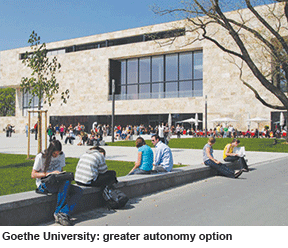 GOETHE UNIVERSITY Frankfurt, established in 1914 as Frankfurt University, was the creation of a Jewish philanthropist and owed much of its growth to Jewish support and academics. But under the Nazis, a third of its staff and students were forced out. The infamous Nazi scientist Dr. Josef Mengele, known as the ‘Angel of Death’ for his notorious experiments at Auschwitz, was among its students.
GOETHE UNIVERSITY Frankfurt, established in 1914 as Frankfurt University, was the creation of a Jewish philanthropist and owed much of its growth to Jewish support and academics. But under the Nazis, a third of its staff and students were forced out. The infamous Nazi scientist Dr. Josef Mengele, known as the ‘Angel of Death’ for his notorious experiments at Auschwitz, was among its students.
Now the university is re-evaluating that history as it marks its centenary while also undertaking an ambitious agenda for change. In a country where universities are closely linked to the state, it has opted for greater autonomy.
Other German universities may be older — such as Leipzig University (600 years) or Ludwig-Maximilians University in Munich (more than 500 years) — but Frankfurt, celebrating its centenary this year, has a unique history. Renamed in 1932 in honour of Johann Wolfgang von Goethe, Frankfurt’s most famous son, who died a century earlier, the university has grand plans for the future. “We aim to become ‘Harvard-on-Main’,” says Werner Muller-Esterl, who has been university president since 2009. “That’s our task for the next century.”
Over the past 15 years, the university has gradually relocated in large part to Campus Westend, a modern, light, glass complex in Frankfurt’s stylish west end. It’s Germany’s “finest university campus”, says Muller-Esterl. Together with the renovation of other outlying complexes, the president feels his university is geared to cope with the steady increase in student enrolments predicted at German universities.
Yet not everyone shares his enthusiasm. “A lot of seminars and lectures are overcrowded,” says Daniel Katzenmaier, chairman of AStA-Uni FFM, the Goethe University Frankfurt students union. Nor is he totally enthusiastic that the varsity switched its funding structure in 2001, becoming Germany’s first major university to transform into a foundation university under public law. It’s now only 60 percent funded by regional taxpayers, with the rest coming from external fundraising and private grants.
Yet in becoming a foundation university again, Frankfurt has returned to its origins. In 1914 it was founded and financed as a private enterprise. It was the brainchild of Franz Adickes, then lord mayor of Frankfurt, and Wilhelm Merton, a Jewish industrialist and philanthropist. Together, they created a university for the people that was largely founded and financed by prominent Jewish benefactors in the city of Frankfurt.
“The Jewish benefactors had a liberal approach,” says Pascal Ballow, part of a group of Frankfurt history students researching the university’s origins. “This project has been an eye-opener for me,” says Erika Wagner, another member of the group. “I didn’t realise Frankfurt University owed so much to Jewish generosity and philanthropy. It’s time to say thank you,” she acknowledges.
In 1933, the Nazis seized power in Germany. The university was a thorn in their side, infested as it was, from their point of view, with Jewish academics and Marxist revolutionaries. A third of university students and staff were expelled once Hitler came to power.
In a final, horrible twist, Dr. Josef Mengele, the German army officer and medical doctor who carried out human experiments at the Auschwitz concentration camp, completed a Ph D in medicine at Frankfurt in 1938 while working at the Institute for Racial Hygiene, which was attached to the university at that time. There, he carried out “racial screening” tests to determine if people were of Aryan descent.
“Of course, Mengele wasn’t the only Nazi at Frankfurt University at the time, but he is by far the best known,” says Benjamin Ortmeyer, a professor who heads a research unit at the university focusing on how pedagogies and syllabuses were used to indoctrinate schoolchildren with Nazi propaganda after the party seized power (and how many teachers actively supported those efforts).
(Excerpted and adapted from Times Higher Education)



























